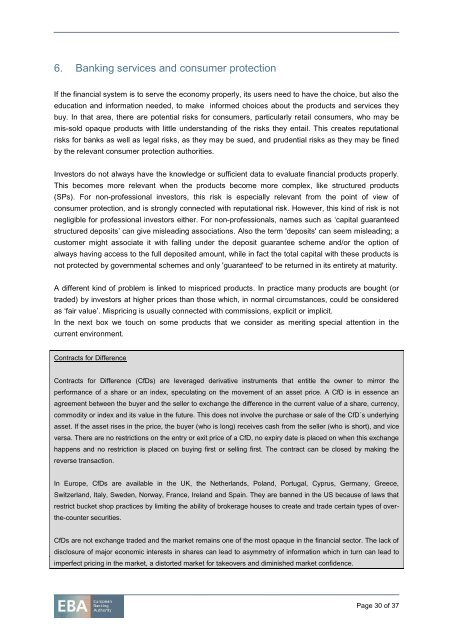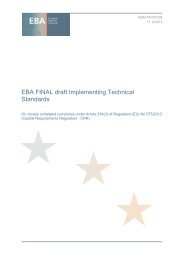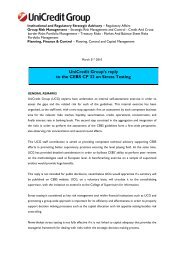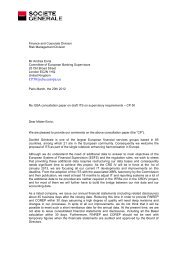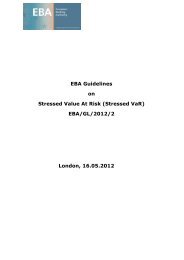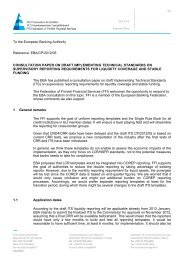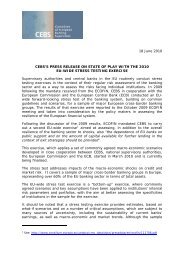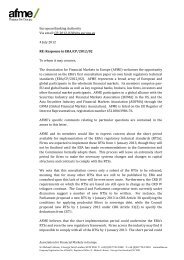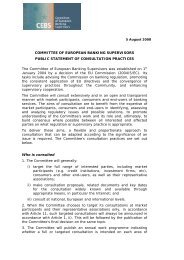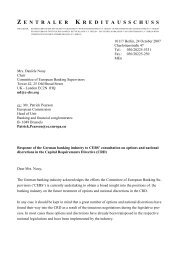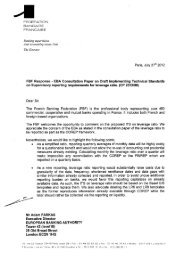EBA Long Report - European Banking Authority - Europa
EBA Long Report - European Banking Authority - Europa
EBA Long Report - European Banking Authority - Europa
Create successful ePaper yourself
Turn your PDF publications into a flip-book with our unique Google optimized e-Paper software.
6. <strong>Banking</strong> services and consumer protection<br />
If the financial system is to serve the economy properly, its users need to have the choice, but also the<br />
education and information needed, to make informed choices about the products and services they<br />
buy. In that area, there are potential risks for consumers, particularly retail consumers, who may be<br />
mis-sold opaque products with little understanding of the risks they entail. This creates reputational<br />
risks for banks as well as legal risks, as they may be sued, and prudential risks as they may be fined<br />
by the relevant consumer protection authorities.<br />
Investors do not always have the knowledge or sufficient data to evaluate financial products properly.<br />
This becomes more relevant when the products become more complex, like structured products<br />
(SPs). For non-professional investors, this risk is especially relevant from the point of view of<br />
consumer protection, and is strongly connected with reputational risk. However, this kind of risk is not<br />
negligible for professional investors either. For non-professionals, names such as ‘capital guaranteed<br />
structured deposits’ can give misleading associations. Also the term 'deposits' can seem misleading; a<br />
customer might associate it with falling under the deposit guarantee scheme and/or the option of<br />
always having access to the full deposited amount, while in fact the total capital with these products is<br />
not protected by governmental schemes and only 'guaranteed' to be returned in its entirety at maturity.<br />
A different kind of problem is linked to mispriced products. In practice many products are bought (or<br />
traded) by investors at higher prices than those which, in normal circumstances, could be considered<br />
as ‘fair value’. Mispricing is usually connected with commissions, explicit or implicit.<br />
In the next box we touch on some products that we consider as meriting special attention in the<br />
current environment.<br />
Contracts for Difference<br />
Contracts for Difference (CfDs) are leveraged derivative instruments that entitle the owner to mirror the<br />
performance of a share or an index, speculating on the movement of an asset price. A CfD is in essence an<br />
agreement between the buyer and the seller to exchange the difference in the current value of a share, currency,<br />
commodity or index and its value in the future. This does not involve the purchase or sale of the CfD´s underlying<br />
asset. If the asset rises in the price, the buyer (who is long) receives cash from the seller (who is short), and vice<br />
versa. There are no restrictions on the entry or exit price of a CfD, no expiry date is placed on when this exchange<br />
happens and no restriction is placed on buying first or selling first. The contract can be closed by making the<br />
reverse transaction.<br />
In Europe, CfDs are available in the UK, the Netherlands, Poland, Portugal, Cyprus, Germany, Greece,<br />
Switzerland, Italy, Sweden, Norway, France, Ireland and Spain. They are banned in the US because of laws that<br />
restrict bucket shop practices by limiting the ability of brokerage houses to create and trade certain types of overthe-counter<br />
securities.<br />
CfDs are not exchange traded and the market remains one of the most opaque in the financial sector. The lack of<br />
disclosure of major economic interests in shares can lead to asymmetry of information which in turn can lead to<br />
imperfect pricing in the market, a distorted market for takeovers and diminished market confidence.<br />
Page 30 of 37


